










P.8
The 2023 MN AG EXPO promised to bring together farmers and industry, and delivered. We combed through the best images from Minnesota’s premier indoor farming trade show.

P.10
During MSGA’s Annual Meeting, MSGA and MS&PC honored directors and industry supporters alike for their dedication to improving the soybean industry.
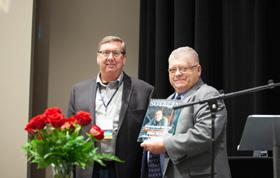
P.22
From annual meetings to food shelf donations. Minnesota’s organized soybean counties continued making community connections through the winter months.

P.34
Let the games begin: Take a stroll through MSR&PC’s Annual Report as the organization looks back on 2022 and plans its next steps in 2023.
P.66
McLeod County is promoting the next generation of farmers by purchasing student memberships for its local FFA chapters.

ABOUT THE COVER
No one single initiative helps improve the bottom line of Minnesota Soybean’s farmers. It takes opening new markets, fighting unnecessary regulations, growing membership, diversifying supply chains and finding new uses for soybeans to put farmers on the pathway toward profitability.
Minnesota Soybean Growers Association Officers and ASA Directors:
OFFICERS
Bob Worth
President
Lake Benton, MN
Lincoln County
Darin Johnson
Vice President
Wells, MN
Faribault County
Brad Hovel
Secretary
Cannon Falls, MN
Goodhue County
Ryan Mackenthun
Treasurer Brownton, MN
McLeod County
ASA DIRECTORS
Jamie Beyer
Wheaton, MN
Traverse County
George Goblish
Vesta, MN
Redwood County
Adam Guetter
Wabasso, MN
Redwood County
Christopher Hill
Brewster, MN
Jackson County
Jim Kukowski
Strathcona, MN Roseau/LOW Counties
Michael Petefish
Claremont, MN Dodge County
Joel Schreurs Tyler, MN Lincoln County
ASA YOUNG LEADERS
Tim Braun
Princeton, MN
Mille Lacs County
Gary Schoenfeld
Waseca, MN Waseca County
Paul Mesner and Mary Dybedahl-Mesner (2021-22 Class)
Chandler, MN Murray County
COUNTY DIRECTORS
Hannah Anderson Barnesville, MN
Clay/Wilkin Counties
Trevore Brekken Crookston, MN Polk County
Mark Brown St. James, MN Watonwan County
Steve Brusven Cottonwood, MN Yellow Medicine County
Steve Commerford New Ulm, MN Brown County
Brian Fruechte Verdi, MN Lincoln County
Theresia Gillie Hallock, MN
Kittson County
William Gordon Worthington, MN Nobles County
Tom Grundman Osakis, MN
Douglas County
Corey Hanson Gary, MN
Norman County
Jeremy Hanson Morristown, MN
Dakota/Rice Counties
Matt Heers Owatonna, MN Steele County
Ray Hewitt
Le Sueur, MN
Scott/Le Sueur Counties
Jim Jirava Ogema, MN
Becker/Mahnomen Counties
Kyle Jore
Thief River Falls, MN
Pennington/Red Lake Counties
Bob Lindemann Brownton, MN McLeod County
Bruce Nelsen Rose Creek, MN Mower County
Keith Nelsen Westbrook, MN Cottonwood County
Robert Nelsen Westbrook, MN Murray County
Tim Nelson New Richland, MN Waseca County
Lucas Peters Luverne, MN Rock County
Nathan Potucek Warren, MN Marshall County
Andy Pulk Wannaska, MN Roseau/LOW Counties
Tim Rasmussen Rothsay, MN
Otter Tail/Grant Counties
Mike Skaug Beltrami, MN Polk County
Cal Spronk
Edgerton, MN Pipestone County
Jamie Seitzer
St Peter, MN
Nicollet/Sibley Counties
Jeff Sorenson Morgan, MN Redwood County
Lawrence Sukalski
Fairmont, MN Martin County
Doug Toreen Bird Island, MN
Renville County
Rose Wendinger
St. James, MN Watonwan County
Earl Ziegler
Good Thunder, MN Blue Earth County
EDITORIAL STAFF:
MSGA Executive Director Joe Smentek Minnesota Soybean Growers Association 888-896-9678 jsmentek@mnsoybean.com
Art Director Doug Monson Sr. Director of Integrated Marketing Ag Management Solutions 888-896-9678 dmonson@agmgmtsolutions.com
Managing Editor Drew Lyon Sr. Manager of Communications Minnesota Soybean 888-896-9678 dlyon@agmgmtsolutions.com
Layout Editors Kaelyn Rahe krahe@agmgmtsolutions.com
Alex Troska atroska@agmgmtsolutions.com
ADVERTISING:
Bailey Grubish, Advertising and Sales Manager 507-740-0064 | 888-896-9678 | bgrubish@agmgmtsolutions.com
Advertising space reservations can be made by the 15th day of the month prior to publication. In consideration of the acceptance of the advertisement, the agency and the advertiser must, in respect of the contents of the advertisement, indemnify and save the publisher harmless against any expense arising from claims or actions against the publisher because of the publication of the content of the advertisement.
Advertisements within this publication contain the opinions and information of the advertisers and do not necessarily reflect the opinions or views of the Minnesota Soybean organizations or affiliated groups.


CIRCULATION:
Soybean Business is published six times a year on behalf of Minnesota Soybean. Comments and suggestions can be submitted to:
Minnesota Soybean Growers Association, 1020 Innovation Lane, Mankato, MN 56001.
mnsoybean.org
The two groups that comprise Minnesota Soybean – MSGA and our partners, the Minnesota Soybean Research & Promotion Council – form a unique tandem. The Council can support MSGA in many ways, through research and studies that arm advocates with data and tools to inform legislators. The push to pass our historic biodiesel law in 2002 is a perfect example of how we work together. The Council’s research and feasibility studies helped MSGA deliver a message to legislators that our homegrown biofuel could be a winner for Minnesota farmers, our economy and environment. More than 20 years later, it’s clear we were proven right on every measure.

The Council also helps provide financial support for leadership activities like last summer’s Future of Soybeans retreat and the annual American Soybean Association’s (ASA) Young Leader program. We are grateful to work alongside the Council. I have a tremendous relationship with my Council counterpart, Chair Joe Serbus, and we are proud to once again publish MSR&PC’s Annual Report in Soybean Business, along with regularly highlighting checkoff investments in these pages. As you’ll see while strolling through the Game of Soy, the Council made huge steps in 2022 and have all the resources at their disposal for even greater success in 2023.
As most – but not all – of you know, one place where the Council can absolutely not go is the lobbying realm. A federal mandate prevents the soybean checkoff from crossing into the legislative arena, and that’s a line every state soybean group must take very seriously. MSGA goes where the checkoff can’t, which is why membership is so important. We depend on our membership dues to fund our advocacy mission. Membership levels start at about 23 cents per day for a three-year membership, and it’s even more cost-effective (just $20 annually) for students. Rural representation in St. Paul and Washington, D.C., decreases seemingly every year, and 2023 is no different. Thus, it’s so important that our strong voice grows louder by increasing our membership. And make no mistake: MSGA is a sound investment in your operation and your industry. Because of our members, we can advocate for
policies here at home and in our nation’s capital.
This session at the Capitol – just a couple years after we led the way in passing Section 179 Tax Conformity, which saved farmers millions of dollars in taxes – we’re doing everything we can to ease the uneven tax burden shouldered by farmers. Skyrocketing property taxes are increasing rent rates, which will make it increasingly difficult for the next generation of farmers to work the land. We know we face an uphill battle on several fronts at the state legislature, but with your membership support, we can ensure agriculture continues to have a voice at the table. If we won’t speak up for our industry, who will?
March and April are busy months for MSGA, as we look ahead to the upcoming growing season. In early March, we held our D.C. Hill Visits and talked the upcoming Farm Bill with legislators, then headed to Commodity Classic with our seven American Soybean Association directors to finalize our resolutions. We hold our annual St. Paul Hill Visits and Legislative Reception in late March before gathering for our spring board meeting in Mankato. Then, if Mother Nature is agreeable, we start the hard work it takes to put our crop in the ground.
All the while, rest assured that MSGA and MSR&PC are staying in their respective lanes to ensure your pathway to profitability is a smooth one. Stay safe this spring, and ride on.
Sincerely,
Bob Worth, President, Minnesota Soybean Growers Association
Farmers face many challenges throughout a growing season, including weather extremes and turbulent markets. One of the most urgent challenges we’ve been dealing with over the past several years is the noxious weed Palmer amaranth.
Palmer amaranth is a fast-growing weed native to the southwestern United States and northwestern Mexico. It has now spread east and north. The weed was first discovered in Minnesota in 2016. It has developed resistance to several herbicides, including glyphosate, making it very difficult and expensive to control.
Left uncontrolled, a single female Palmer amaranth plant typically produces 100,000 to 500,000 seeds. It can cause substantial yield losses and greatly increase weed management costs in soybeans and corn.
Because of the costly and damaging impacts that the weed could have on Minnesota’s crops, the Minnesota Department of Agriculture (MDA) has been monitoring for the weed, wiping out any Palmer amaranth plants found in the state and identifying ways to stop the spread of the weed into the state.
The MDA has investigated Palmer amaranth at 94 sites in 22 counties since 2016. Of these sites, Palmer amaranth was found at 34. Farmers and landowners have worked collaboratively with the MDA and the University of Minnesota Extension to control infestations. Control efforts include targeted genetics and herbicides to tackle glyphosate-resistant Palmer amaranth as well as hand pulling and other tools. Our success will depend on each impacted landowner taking action to prevent seed production and spread.
The MDA has also uncovered many ways Palmer amaranth has or can come into Minnesota, including contaminated seed, screenings, manure, and possibly equipment. At this time millet seed, sunflower screenings and manure are the riskiest sources and have led to infestations in the state.
It will take all of us to prevent Palmer amaranth from becoming another waterhemp or worse, gaining a widespread foothold in Minnesota. That’s why we’ve proposed legislation this session to fund grants to local units of government and Tribal nations for noxious weed detection, control and management, including battling Palmer amaranth.
You can also be proactive and prevent the establishment of this weed. Familiarize yourself with Palmer amaranth identification and actively look for it in crop fields, borders, ditches, conservation lands and around dairies.
Avoid entering areas where Palmer amaranth is suspected or confirmed. If you must enter an infested area, always clean vehicles, equipment and clothing prior to exiting. If planting grasses and other flower mixes for conservation plantings, carefully review the seed label to ensure that no noxious weeds are present.
We’ve initiated a campaign to raise awareness, help people figure out how to identify Palmer amaranth, and how to report it to us for confirmation and advice. Visit amaranthaware.com for more information on the invasive weed. We must all work together to stop the spread of this weed into the state.
Thom Petersen, Commissioner, Minnesota Department of Agriculture
HERE’S HOW THE SOY CHECKOFF WORKS. The national soy checkoff was created as part of the 1990 Farm Bill. The Act & Order that created the soy checkoff requires that all soybean farmers pay into the soy checkoff at the first point of purchase. These funds are then used for promotion, research and education at both the state and national level.
1/2 of 1% of the total selling price collected per the national soybean act & order








Half goes to the state checkoff for investment in areas that are a priority for that state.
RESEARCH PROMOTION
Half goes to the national checkoff for investment in USB’s long-range strategic plan.

You’re where the rubber meets the road. And the engine. And the interior.









All soybean farmers, including you, are busy replacing petroleum with your soy oil. How? By pooling your resources through your soy checkoff. Learn how your soy checkoff is bringing tangible returns back to you and your operation at unitedsoybean.org/hopper


The 2023 MN AG EXPO brought together nearly 1,000 farmers and industry leaders for a two-day trade show and networking and education event. Attendance neared record highs on the first day, as farmers and industry leaders walked the trade show floor and listened to an address from Gov. Tim Walz.Two days packed with learning sessions, keynote speakers and engagement on the sold-out trade show floor helped the continued development of the building blocks that the agriculture industry stands on.“This year’s EXPO was second to none,” MSGA President Bob Worth said.
Join us next year in Mankato for the 2024 MN AG EXPO, which takes place Jan. 17-18, 2024.


Photos by Lori Marie Photography and Soybean Business Staff

It
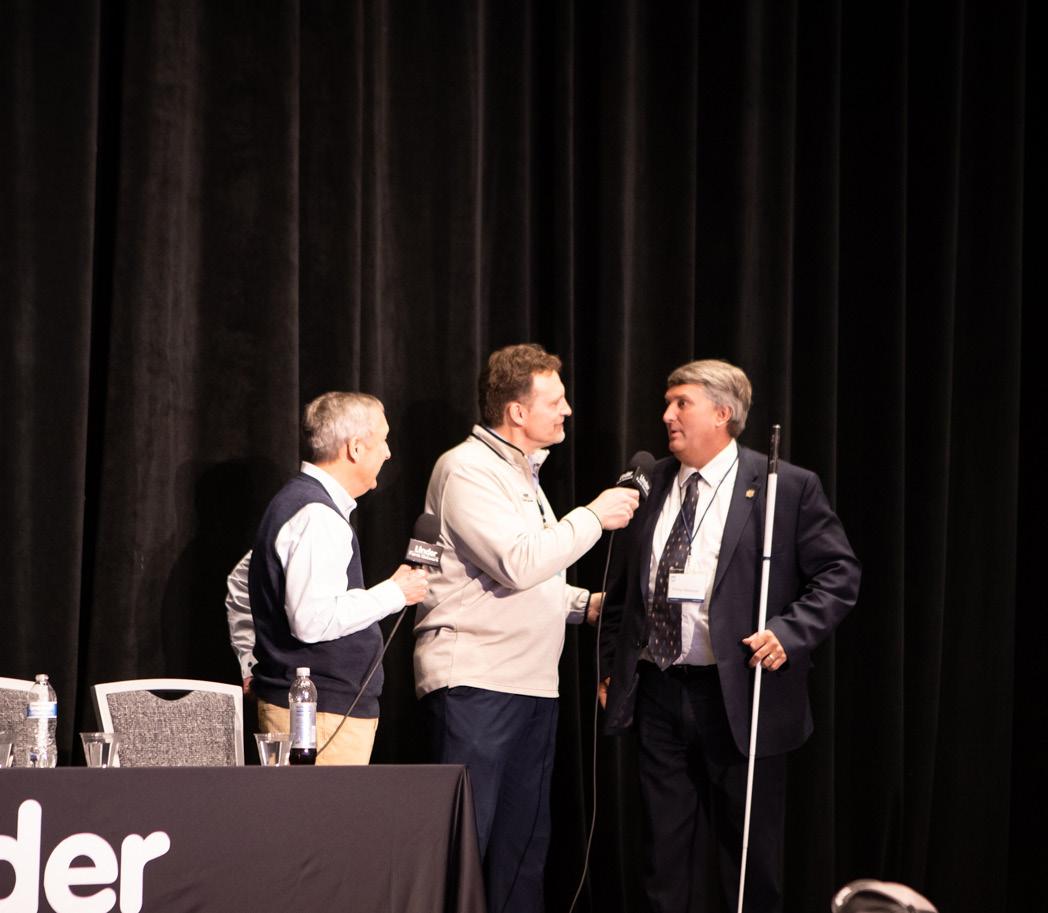
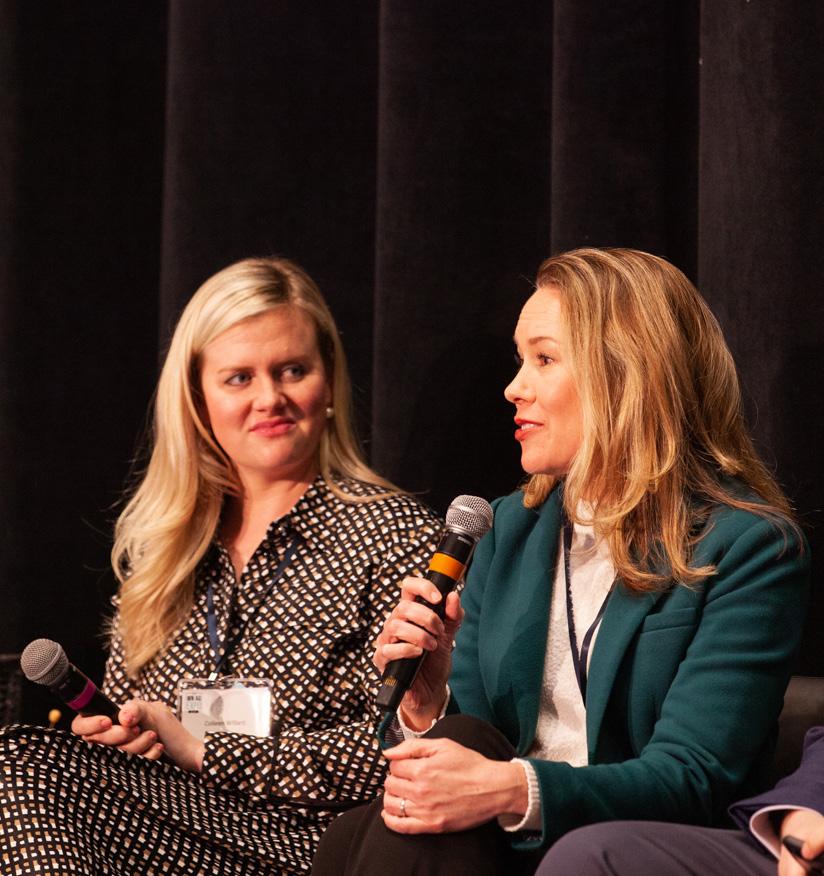
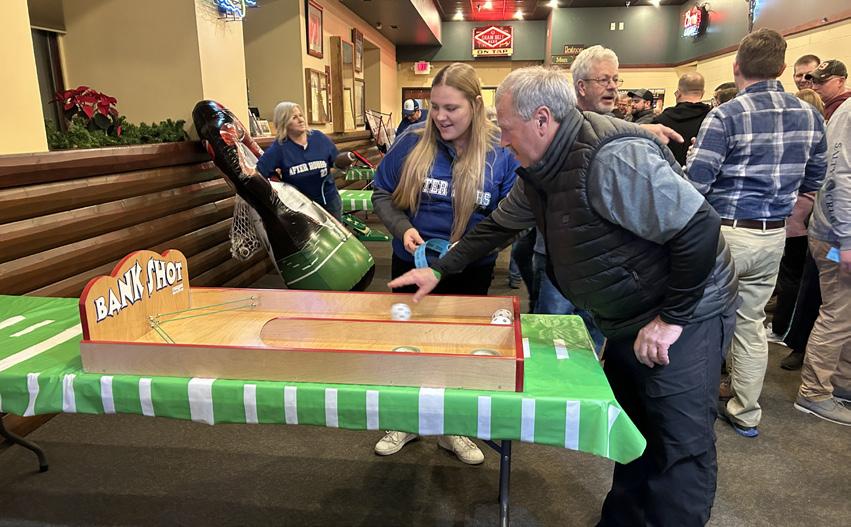



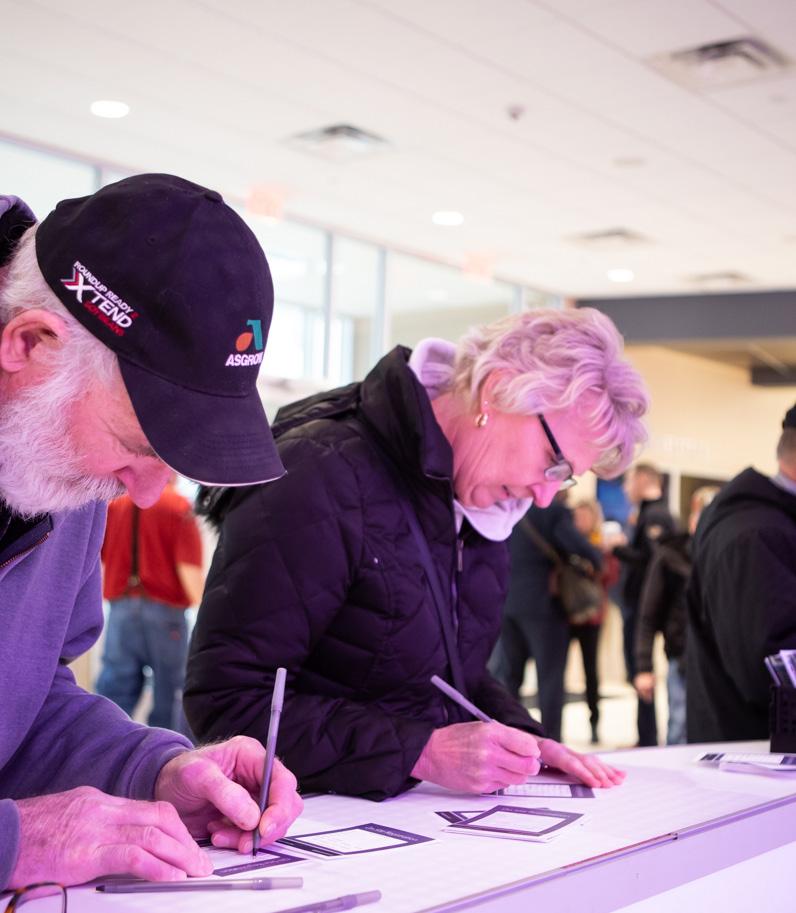



During the Minnesota Soybean Growers Association’s Annual Meeting at MN AG EXPO, the organization announced its yearly awards to deserving farmer-leaders and industry supporters. Executive Director Joe Smentek and President Bob Worth presented on behalf of MSGA, while Minnesota Soybean Research & Promotion Council Chair Joe Serbus honored the Council’s Industry Leader and a fellow director.

The winner of Minnesota Soybean’s County of the Year borders North Dakota and Canada but is Minnesota all the way.
As they do every year, in 2022 the Kittson County Soybean Growers continued to step up for their commodities and their communities. To that end, County participated in the Stepping Up campaign; donated pencils with soybean messaging to local schools, made ham and turkey holiday donations and held an MSGA membership night, among many other activities.
MSGA is well-represented in this county: Of the 150 soybean growers in Kittson County, nearly half are active MSGA members, including Theresia Gillie, who represents Kittson County on the MSGA board. Each year the board sends thank you letters to their members and includes a $10 gift card to be used at different businesses in their county. They remind the members how important their dedication to agriculture keeps the voice of farmers alive and heard at the local, state, and federal level. Kittson County growers truly value all their members and the commitment of family farming in their community.

This county always works as a team. Each director makes a great effort to be at county meetings and always willing to help on any project. They are truly a staple in their community.
Whether serving as a director or on the governing board, Beltrami farmer Mike Skaug has been a huge asset to MSGA. He represented the organization with distinction as president from 2021 to 2022.
Mike’s term as a president was a challenging one, given the evolving circumstances of the pandemic. But thanks to his calm demeanor and deep farming knowledge, Mike guided MSGA as we returned to the business of inperson meetings and helped move MSGA forward. We are grateful to Mike for his dedication to MSGA and our industry. Mike also serves as chair of the Ag Innovation Campus, as the crush facility in Crookston prepares for its 2023 production launch. We are thankful Mike continues to serve MSGA as a director and salute him for a successful year as president. Thank you, Mike!
The recipient of our Industry Partner of the Year Award has put their money when their mouth is when it comes to supporting MSGA and Minnesota farmers.
Profinium has been a longtime sponsor of MSGA events, including MN AG EXPO, Biodiesel Open and last year’s Ice Fish House raffle. They’re also a regular advertiser in Soybean Business Magazine, helping to fuel MSGA’s advocacy mission.


MSGA greatly appreciates Profinium’s financial support over the years and values their partnership and looks forward to working together in the years ahead. This company truly appreciates that agriculture is the backbone of our state’s economy. We thank Profinium for their contributions, which allow us continue fighting on behalf of Minnesota farmers.
“Wethankourboardofdirectorsandourgoverningboardforthehardwork they’veputintomakingMSGAasuccessfulorganizationfor61yearsnow.This boardisfarmer-ledineveryway,andweappreciateeachandeveryoneofyoufor investingyourtimeinMSGA’sadvocacymission.”-MSGAPresidentBobWorth
The recipient of our 2022 Soy Advocate of the Year is a trailblazer who isn’t afraid to ask the tough questions.
Jamie Beyer has worn many hats with MSGA. Young Leader. Director. County organizer. Vice President. President. Jamie had an incredibly difficult task as president. When she took the helm in summer 2019, she couldn’t have foreseen the roadblocks she’d have to navigate over the next two years. But Jamie adjusted and helped lead MSGA as we shifted toward virtual advocacy and hybrid meetings. Along the way, she kept us on course. Despite a contentious legislative environment, Jamie worked with leaders of both parties and helped us achieve huge policy wins on behalf of our members, including Section 179 tax conformity, which saved our industry tens of millions of dollars. It was thanks to Jamie’s leadership that this top MSGA priority became a reality.
MSGA is fortunate Jamie continues to lead us. She’s currently one of our directors on the American Soybean Association, helping to represent us at the federal level. Advocates don’t come stronger than Jamie. We are grateful she continues to speak up and ensure the voice of our farmers is heard loud and clear on a variety of policy issues.
Continued on page 12
Each year, the Council recognizes an Industry Leader of the Year that has stepped up to the plate when the soybean industry needed them. This year, we’re excited to present this award to Brushvale Seed. This family-owned company’s commitment to advancing the soybean industry is commendable and has not gone unnoticed.

MSR&PC wisely invests checkoff dollars to develop innovative products that drive the soybean industry into new markets. One of those ventures, TruSoya Non-GMO High Oleic soybeans, celebrated their commercial launch last year, thanks in large part to Brushvale’s support. Along with promoting the variety and providing essential insights, they worked to preserve the value chain, which is integral to the success of TruSoya. Accomplishments of this magnitude wouldn’t be possible without industry partners like Brushvale.
As a family-owned company dedicated to the research and development, production and processing of identity preserved food grade soybeans, Brushvale continues to provide vital support to MSR&PC, and we look forward to a bright future with them.
OnbehalfoftheMinnesotaSoybeanResearch&PromotionCouncil,Ithank MSGAforinvitingmetoyourAnnualMeeting.Weappreciateworkingtogether, andI’dalsoliketocommendmyfellowCouncildirectorsforhelpingtowisely directMinnesota’ssoybeancheckoffresources.”-CouncilChairJoeSerbus
MSR&PC carries a great responsibility in representing Minnesota soybean farmers and directing their checkoff dollars in ways that will further the industry. It takes dedicated individuals to bear that duty, and Kris Folland has proven himself as one of those individuals time and time again.
During his tenure as a Council director, Kris has been a fierce advocate for Minnesota soybean farmers and the soybean industry. He doesn’t hesitate to let his voice be heard and, as the chair of the research action team, he has wisely directed checkoff dollars towards projects that strengthen the soybean industry. Representing District 1, 2 and 3, Kris never loses sight of the Council’s mission and has expertly navigated many obstacles facing our industry. Kris also represents MSR&PC on the Northern Crops Council.
We wouldn’t be the innovative organization that we are today without a sound team of leaders directing it. We thank Kris for being one of those steadfast leaders and serving Minnesota soybean farmers.

 By MSGA Executive Director Joe Smentek
By MSGA Executive Director Joe Smentek
MSGA has had a proactive, constant presence in legislative and regulatory arenas since its creation 61 years ago. Our farmer-leaders have led the charge on passing legislation to help farmers, along with stopping legislation that would harm their operations.
MSGA also makes sure the voice of Minnesota’s 27,000 soybean farmers is heard during rulemaking processes.
Unfortunately, the Minnesota Administrative Procedures Act and the Federal Administrative Procedures Act stack the deck heavily in the regulatory agencies’ favor. This means many times, even though there are legitimate concerns raised by MSGA, farmers’ concerns are minimized and ignored by regulatory agencies. Once a regulatory agency denies a contested case hearing and essentially rules in its own favor, options are severely limited as to what can be done. In most cases, the only option is to sue the agency in court.
Member-driven

MSGA’s advocacy efforts are funded largely in part by our members and industry supporters. In accordance with the Soybean Act and Order that created the federal soybean checkoff, zero checkoff dollars can be used to influence units of government. As anyone with a passing knowledge of TV law dramas knows, lawsuits are expensive and drawn out. While MSGA has been making strategic investments trying to build a bank account to fund court activities, our budget falls far short of being able to enter lawsuits challenging agency action.
Fortunately, MSGA has found some key partners willing to help us challenge actions of regulatory agencies in the past year. MSGA joined with Gharda Chemicals, the American Soybean Growers Association, U.S. Sugarbeet Association and a collection of state sugarbeet and soybean associations to challenge EPA’s actions against the use of chlorpyrifos. This action is moving its way through the necessary procedures under the Federal Administrative Procedures Act. We are arguing that EPA’s actions completely eliminating tolerances for chlorpyrifos go against EPA’s own scientific findings that there are safe uses for the chemistry.
MSGA also found partners with much deeper pockets

to challenge the EPA’s actions on tailpipe emissions on vehicles. In suits challenging the tailpipe emission standards for light duty and heavy duty vehicles, we joined other liquid fuel companies in arguing that the standards improperly force companies to incorporate electric vehicles into their car lines in order to meet these standards and that the rules laid out frustrate the purpose of federal statutes such as the Renewable Fuel Standard. These same partners are helping MSGA join litigation that challenges the reinstatement of the California waiver under the Clean Air Act.
Finally, MSGA is working with other groups to challenge rules passed by the MPCA in state that force adoption of electric cars. Recent Supreme Court cases cast doubt on the validity of these rules, and we will be working to make sure the proper precedents are followed.
Thankfully, in these cases we found partners with substantial financial resources. That will not always be the case. As more and more advocating takes place in the state and federal courts, membership in MSGA matters more than ever to make sure we stand up and speak out for soy farmers wherever we need to secure more policy and regulatory wins.
The Minnesota Department of Agriculture has announced it will keep state-specific use restrictions for three dicamba herbicide products the same for the 2023 growing season in Minnesota. The restrictions are aimed at curbing offsite movement of the products, and follow the guidelines recommended by the Minnesota Soybean Growers Association’s prior to the 2022 growing season. MSGA’s recommendations led to a steep drop in complaints in 2022.
“Our No. 1 goal was to keep this product for safe use because it does work,” said MSGA President Bob Worth, who also chairs MSGA’s Drift Task Force. “We’re glad the Minnesota Department of Agriculture is working to make that happen.” In February, the EPA also announced it would not overrule MDA’s decision, clearing the way for Minnesota farmers to safely use dicamba in 2023.
The affected dicamba formulations are Engenia by BASF, Tavium by Syngenta and XtendiMax by Bayer. These are the only dicamba products labeled for use on dicamba-tolerant soybeans.
The three products are registered for use in Minnesota in 2023 with the following restrictions:
• Date Cutoff: No application shall be made south of Interstate 94 after June 12, 2023. North of Interstate 94, use is prohibited after June 30, 2023.
• Temperature Cutoff: No application shall be made if the air temperature of the field at the time of application is over
85 degrees Fahrenheit or if the National Weather Service’s forecasted high temperature for the nearest available location for the day exceeds 85 degrees Fahrenheit.
Users can download these restrictions from the product manufacturer’s website, and must be in the user’s possession during application.
“These restrictions mirror what we did in 2022 when we saw a major decrease in complaints of off-target movement from the previous year,” MDA Commissioner Thom Petersen said. “These products must be used without impacts on neighboring homes, farms and gardens. The Minnesotaspecific restrictions are based on scientific evidence from our drift investigations and discussions with the University of Minnesota Extension and (MSGA’s) Drift Task Force.”
During the 2022 growing season, MDA received 25 formal complaints and eight responses to an informal survey, all alleging off-target movement. This was a major decrease from 2021, which saw a total of 304 formal complaints and survey responses.
“The restrictions worked perfectly last year,” Worth said. “The people that had any problems, it happened because they went off-label and applied it wrong.”
Other federal requirements for the products that appear on the product labels include:
• Requiring an approved pH-buffering agent, also known as a volatility reducing agent, be tank mixed with dicamba products prior to all applications
• Requiring a downwind buffer of 240 feet and 310 feet in areas where listed endangered species are located
• Additional recordkeeping items
In addition to the cutoff date, Xtendimax and Tavium have crop growth stage cutoffs.
Since dicamba was first registered for use on dicamba-tolerant soybeans in the 2017 growing season, MDA has fielded complaints of alleged off-site movement onto neighboring property. The chemical is highly volatile and can damage non-target plant species through spray drift and/ or volatilization. Volatility is influenced by several factors including temperature, relative humidity, rate of application and crop stage.
In Minnesota, Engenia, Tavium and XtendiMax formulations of dicamba are approved for use on dicamba-tolerant soybeans only and are “Restricted Use Pesticides.” The dicamba products are only for retail sale and use by certified applicators.
Pesticide product registrations are renewed on an annual basis in Minnesota.

MDA: Dicamba to remain available for producers in 2023
MSGA’s 2022 recommendations led to steep drop in complaints
The Minnesota Soybean Research & Promotion Council (MSR&PC) dedicated checkoff funds to reimburse the incoming generation of farmers who complete the Minnesota Private Pesticide Applicators certification.
Minnesota’s soybean checkoff program is designed to provide tools to producers. When the idea to offer reimbursement for farmers to certify as Minnesota Private Pesticide Applicators, there was no hesitation from Council directors.
“We want to encourage our farmers to receive this license, and in particular, we wanted to offer an incentive to farmers on the younger side,” Council Director Kris Folland said. “Being good stewards is important to our board, and this training is a big step in that process.”
The first 200 farmers between the ages of 18-35 can apply for reimbursement for the $75 through MSR&PC. The certification lasts for three years.
“Offering reimbursement is twofold – our farmers need to be very confident when it comes to spray application,” MSR&PC Research Director David Kee said. “First, their sprayers are either their best friend or their worst enemy. When improper spray application is used to distribute crop protection materials, which are highly important for successful farming, it can cause off target damage. This is one of the biggest black eyes in farming. Number two, once they possess their private applicator certification, they’re allowed to utilize restricted pesticides, which can only be used by certified applicators.”
To apply for reimbursement, the form can be found at mnsoybean. org/msrpc/. It can be completed online, and emailed or printed out and mailed in. Once the form and applicator identification number are received, the check for reimbursement will be mailed out to the applicant.
Information to take the exam
can be found on the University of Minnesota Extension’s website. Study materials are available for free online, or a print version can be purchased. The exam itself can be take online or a paper mail-in version is available for pick up at the extension office. The exams are offered in February and January of each year and the Minnesota Department of Agriculture (MDA) suggests taking recertification before March 1 of the expiration year to avoid a gap in certification.
Minnesota has more than 16,000 certified Private Pesticide Applicators using Restricted Use Pesticides (RUP), and MSR&PC wants to help grow this number with the offer of this reimbursement. When farmers hold their own certification, they have more control over the pesticides they’re using and when they’re applied.
“The Private Pesticide Applicator certification allows you to be timely,” Kee said, “and in farming timing is key and is one of the keys to success with pesticides.”
The Minnesota Soybean Research & Promotion Council voted to reimburse the cost of the exam (a $75 value) for the first 200 farmers between the ages of 18-35 who apply for reimbursement through MSR&PC.
To qualify for reimbursement through MSR&PC, you must be able to provide your Private Pesticide Applicator number as proof of taking the exam.
The certification is good three years. Visit
Growing both soybeans and farmers are specialties of the American Soybean Association’s (ASA) Corteva Young Leader program.
Minnesota soybean farmers work to grow the best product, but one of the best products they can grow is themselves through leadership courses.
Minnesota farmers Tim Braun and Gary Schoenfeld were accepted into the leader program for 2022-23. This is a two-phase program, with a third phase held in Washington, D.C., later this summer for qualifying leaders. In late November, the pair completed phase one of the program during a visit to Corteva’s headquarters in Johnston, Iowa.
“We had leadership training, and how to be a better voice for agriculture,” Schoenfeld said of the first phase.
As part of the program, Schoenfeld and Braun will serve as at-large directors with the Minnesota Soybean Growers Association. In December 2022, they both participated in their first MSGA board meeting. During the meeting, the two farmers learned about MSGA’s priorities and how MSGA works with the Minnesota Soybean Research & Promotion Council, the checkoff board that is

a longtime financial sponsor of the Young Leader program.
“Developing the next generation of advocates is so important to MSGA, and we were pleased to welcome Gary and Tim to their first board meeting. MSGA is a family, and we’re glad to welcome them into the fold,” said MSGA President Bob Worth, a graduate of the program. “It’s very important that we grow and develop emerging leaders to keep MSGA going, and the Young Leader program is a key step in that process. The Young Leader Program is a big step in building those crucial leadership skills.”
Braun is from Mille Lacs County, where he grew up on his family farm and eventually started his own operation (he’s still working with his family). Schoenfeld is a fourthgeneration Waseca County producer who also farms with his family.
Though they hail from from different parts of Minnesota, both have a common goal of wanting to grow their leadership knowledge. In March, they’ll graduate as Young Leaders and will be involved in MSGA’s resolution process during Commodity Classic in Orlando.

“I got involved because I wanted to get more involved at a bigger level within the state and nation on telling my farm story,” Braun said.
Every farmer, no matter the acreage, crop or geography of their operation, has a story to share. The program shapes agriculture leaders and connects their stories around the nation. By doing so, it creates a network for them to connect and help each other.
The Schoenfelds operate a fourthgeneration farm in Waseca County. One of the unique aspects of the
MSGA and the Minnesota Soybean Research & Promotion Council have a proud history of supporting Young Leaders who would later climb the ranks of both organizations. Past ASA Chair and Worthington farmer Bill Gordon is a graduate, along with a who’s who of current MSGA, ASA and Council directors. “It was a really good experience,” said MSGA Treasurer Ryan Mackentun, a member of the 2019-20 class. “After attending this program, I feel like I will be a far better advocate for agriculture for the rest of my life. ”The Young Leader program was established in 1984.
leadership program is the inclusion of spouses and both Tim and Gary jumped at the chance to develop their skills with their partners. Renae Braun and Tina Schoenfeld joined their husbands for the program, gaining information from their own perspectives of the training.
“I think it’s nice to (go through the program) as a couple because it shows our personalities on how we handle things,” Gary Schoenfeld said. “It shows how we can work better together and communicate better.”
Tina Schoenfeld added that between farming together and the other agriculture work they do together it just makes sense and feels right to work and grow in the
leadership program as a team.
“I feel more confident in speaking with people on a public speaking level,” she said. “I feel more confident in being able to do that, with the tools that we were provided and able to practice a little there.”
Renae Braun and Tina Schoenfeld are vital parts of both operations, working on the farm in various ways, from preparing meals to running machinery to caring for the animals and the kids.
“Renae comes from a nonagriculture background, so it’s good for her to get exposed to some of the people, too, and hear some of the stories,” Tim Braun said. “It’s great to include both of us.”
Renae and Tim Braun are growing their leadership skills – together.

“The program for what we saw here (phase one) right away was pretty darn good,” Braun said. “I enjoyed the time we spent there and hopefully we can enjoy our time down at Classic in Orlando and keep building the relationships we started here.”
The Brauns and the Schoenfelds plan to attend to continue growing their skills.
“If it’s like the last two days was,”
Gary Schoenfeld said during an interview in the midst of phase one, “It’ll be a lot of fun to learn more and get to know the other people in our class.”

Throughout the Young Leader program, the Brauns and Schoenfelds will enhance their leadership, interviewing and public speaking skills. They’ll also have opportunities to network with other young agriculture leaders.
“My goal is to continue to build that network,” Tim Braun said. “That’s a key piece, getting to know people across the country as well as just being able to communicate better.”
The ASA Young Leader Program started in 1984 and continues to develop strong leaders across the country. Many directors from MSGA and MSR&PC leaders have completed the program before becoming state and national directors.
“It’s just amazing to hear everybody’s story. They’re similar, but different – they’re all so unique,” Tina Schoenfeld said. “It was such beneficial information that I feel like I can perfect with practice. I can grow to be an advocate for agriculture, which is not something that I had ever planned as I don’t come from a farming background.”
Minnesota Farmers Union (MFU), in partnership with the Minnesota Department of Agriculture’s (MDA) Minnesota Ag Water Quality Certification Program (MAWQCP) and Farmers Legal Action Group (FLAG), published the first edition of its Farmers’ Guide to Carbon Markets in Minnesota in early 2023.

With one-fifth of the world’s largest companies setting net-zero emissions targets, farmers are being asked to make changes to their operations that sequester carbon and sell companies credit for that sequestered carbon. These relations between farmers, large companies and often third-party vendors are defined by contracts.
The 32-page guide written by attorneys Stephen Carpenter and Lindsay Kuehn is filled with information to help farmers navigate complex carbon contracts. There’s a handy question-and-answer section that draws on text taken from actual contracts and information to better equip farmers for discussions with the representative offering the contract. Through the guide, MFU hopes to respond directly to farmers’ concerns, empower new leaders on
climate and to advance solutions on agricultural and working lands.
The booklet tackles three approaches:
• Discusses the current market for carbon contacts and in particular some of the aspects of these markets that can become important for the contract terms
• Discusses a few points in Minnesota contract law that can be important for carbon contracts

• Looks at selected contract language and the meaning of that language
MAWQCP-certified producers who have obtained the Climate Smart Endorsement will receive a hardcopy of the Farmers’ Guide to Carbon Markets.

“Minnesota farmers now have greater opportunities to combat climate change by tapping into this new and evolving carbon marketplace; however, we must recognize the concerns farmers may have,” said MDA Commissioner Thom Petersen. “We’re pleased to partner with Minnesota Farmers Union and Farmers Legal Action Group to develop this guide that will ensure farmers have access to the information they need to succeed in this evolving carbon contract arena.”
Ten farmers and industry leaders served as advisors to the guide.
“The carbon markets are really in their infancy, without a lot of regulation and common structure,” said MFU member and Farmers Guide to Carbon Markets advisory group member Pat Lunemann of Twin Eagle Dairy in Clarissa. “Carbon markets are like the ‘Wild, Wild West’ where everyone is shooting from the hip. No entity is there to assure that contracts are fair to both parties involved. Going forward, there is much potential for farmers to capture rewards for innovative practices on their farms and the guide describes the opportunities and the obstacles that may be in front of us.”
The Farmers Guide to Carbon Markets is available on the MDA’s website. Farmers who have obtained the Climate Smart Endorsement will receive a hardcopy of the Farmers’ Guide to Carbon Markets. Farmers and landowners interested in enrolling in the MAWQCP can contact their local Soil and Water Conservation District or visit MyLandMyLegacy.com.
The Minnesota Agricultural Water Quality Certification Program rewards farmers like you for what you do best, taking care of your land and its natural resources.


To get started and learn more, contact your local soil and water conservation district or go to:
MyLandMyLegacy.com


Our founding farmers took action 22 years ago to launch ASA’s World Initiative for Soy in Human Health so WISHH could grow new markets for U.S. Soy. Today, WISHH is working with strategic partners that use soy for food or feed in 28 countries across Asia and Latin America to sub-Saharan Africa.

Find out how WISHH’s three pillars of trade, development and food security cultivate new markets for U.S. Soy protein.

 Trade. Development. Food Security.
Trade. Development. Food Security.
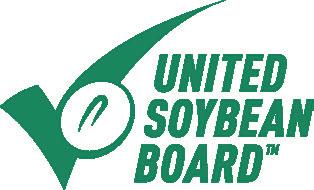

The months of planning have started to reap rewards. Counties throughout Minnesota’s organized soybean program spent the final weeks of 2022 and first months of 2023 making donations and planning upcoming events including annual meetings, golf outings and numerous other engagements that tie county boards to their communities.
In December 2022, Nicollet/Sibley showcased the value of soy foods and spread holiday cheer. The board made its annual trip to Hy-Vee in New Ulm and purchased products containing soybean oil. The board then placed soybean labels on the products and donated them to county food shelves.

“I always look forward to this event each year,” Board Chair Brett Annexstad said. “Not only are we educating others about our products, but we are also giving back during the holidays.”
Sponsoring other ag events in the counties is important to county soybean boards. In March, Nicollet/Sibley did its part by partnering with University of Minnesota Extension to host a crop management seminar.
Freeborn County is sponsoring the Chamber Ag Luncheon. During these events, county boards showcase new and innovative projects the checkoff participates in, and the ways local farmers collaborate with other ag entities.
In January, Olmsted/Wabasha and McLeod hosted their respective annual meetings, pulling in soybean farmers from their counties. McLeod featured speaker Jerrid Sebesta, who spoke about his life after he married into a farm family. Olmsted/Wabasha highlighted checkoff wins from the past year.

In January, the Lincoln County board invited local growers to hear from MinnStar Sr. Vice President and farm management analyst Kent Thiesse speak. Thiesse delivered background on cash flow margins in 2022 and recent years, managing inflation, higher interest rates, increasing input costs, the importance of grain marketing decisions and strategies, crop insurance strategies, the next Farm Bill and other farm policies.
In February, the board held its annual meeting at the Ivanhoe VFW. Eighty-five attendees bid on silent auction items, heard updates from the county board on how they are utilizing corn and soybean checkoff dollars. Minnesota Department of Agriculture Commissioner Thom Petersen delivered remarks.
Lincoln County raised more than $23,000, enough to provide 12 scholarships for local high school students interested in pursuing agricultural professions.
As part of the Stepping Up promotional effort, Nobles County donated 50 pairs of Skechers soy-based GO shoes to the Worthington and Adrian Ambulance crews, as well as first responders throughout the area.
Watonwan County held its annual meeting in late January. Around 65 people attended to hear updates from the board, checkoff representatives and Suzanne Sukalski, aka Sunshine Suzy.
Suzy spoke at their annual meeting on her journey through hardships growing up with Down Syndrome and how she built a successful business. Suzy sells and markets her various flavors of corn nuts, works as a breakfast hostess at the Fairmont Hampton Inn, is an inspirational speaker, entrepreneur and more.
Suzy’s father, Lawrence Sukalski, sits on both the Minnesota Soybean Growers Association (MSGA) and United Soybean Board and gave updates from the state and national organizations.
The board thanked its sponsors for the support over the years as well as the countless volunteers and FFA volunteers. During elections, MSGA Director and former ASA Young Leader Rose Wendinger was voted onto the board.
Lyon County has long been a supporter of the FFA program and continued sponsoring the annual FFA Ag Bowl.
In early February, around 1,200 FFA competing students arrived at Southwest Minnesota State University (SMSU). The students attended from around the state to compete in various FFA competitions.
During the event, the board set up a table to share
education with the students on corn and soybeans through a game of trivia. This brought students to the table to test their knowledge on the various subjects. Just down the hall, Murray County displayed a few of its safety demonstrations.
The first demonstration setup showed importance of labeling bottles that are found in the shop and around a farm site and that not everything on original bottle label is entirely correct.
The second part was a demonstration of grain bin safety. The board took a water jug that had corn, a balloon in the middle and corn on top to show that you can’t see where the air bubble is or if there is one when in the bin. They then took LEGO figures and placed them on top and popped the balloon, simulating the collapse of the corn in the bin and how quickly it can happen.
Students were interested by the challenge of identifying the liquids and of the reality of the grain bin information. Both boards find value in being in front of thousands of students to teach them about farm safety and soybeans.

Yellow Medicine Soybean Growers bought county FFA students MSGA memberships.
Working with the schools, the board will gain student members, which they hope brings more involvement from them for their volunteering events and the annual meeting.
Nobles County donated biodiesel to their local FFA chapter. With this support, the FFA students attended the National FFA Convention & Expo that took place in October 2022 in Indianapolis. The board is happy to support local agriculture organizations to help contribute to the growth of involvement in agriculture from the next generation.
Continued on page 24
Clay Wilkin County kicked off the year with its annual meeting during the Small Grains Update in Dilworth. Chair Jeremy Tischer briefed the crowd on the various projects the organization undertook in 2022, as well as their plans for 2023. Minnesota Corn and Minnesota Soybean leaders gave updates, and the board elected a new member.
During the 2022 holiday season Swift County donated $500 worth of hams to their local food shelf.
“We always look for ways to support our local community,” Board Chair Tony Hughes said. “Being able to use our checkoff dollars to make someone else’s holiday a little brighter felt like the perfect opportunity to make a difference.”
Swift County also used checkoff resources to donate to their county’s backpack program, Benson Area Cares 4 Kids. Every student in need who received a backpack of food also went home with a postcard detailing the common foods and products that soybeans are found in.
In January, Kittson County held its annual meeting in conjunction with the Small Grains Update meeting and Kittson County Crop Improvement in Lancaster. The keynote speakers were Ag Mafia, which offers education that agronomists, crop consultants, farmers and others in the industry need to know.

Marshall County convened for its annual breakfast meeting in December. Mike Skaug, MSGA director and chair of the Ag Innovation Campus, provided updates on both organizations. The keynote speakers were market analyst Jody Miller and North Dakota State University Research Specialist Darin Eisinger.
Polk County hosted its meeting in Crookston in January. Minnesota Soybean’s Mike Youngerberg gave an update on the AIC; Mike Skaug previously set up a tour of the AIC for the Polk County growers in late 2022. Polk County also donated $1,000 to the Mentor Fire Department for rescue equipment.
Pennington/ Red Lake County are hosting their annual meeting at the end of March. NDSU Soil Science Specialist Dave Franzen, will serve as keynote speaker. The board continue to promote Minnesota Soybean messaging with radio, signage and print ads. Last year, the board donated dollars to the county fire departments.

Norman County works closely with KRJB Radio to help promote soybeans and corn throughout the county. They have several projects in March. They hosted their annual meeting in January, bringing in approximately 80 attendees. During the holiday season, Norman County donated $500 of fresh turkeys to the Rural Enrichment and Counselling Headquarters (REACH) to help those struggling with hunger.
Roseau/Lake of the Woods provided donations to local food shelves and county fair. The board also delivered books to elementary schools in 2022. They held their annual meeting in February with industry leaders in conjunction with PPAT. MSGA Directors Jim Kukowski (who also represents MSGA on ASA) and Andy Pulk provided state and federal policy updates.

After an extended wait due to pandemic-related travel restrictions, the Northern Soy Marketing (NSM) team landed in Thailand in January 2023 to communicate the high-quality value of northern-grown soybeans.

Farmers and research arrived carrying the same message: There’s greater value in essential amino acids (EAA).
NSM trip participants – which included Minnesota Soybean Research & Promotion Council Director and NSM Chair Patrick O’Leary, North Dakota Soybean Council Director and NSM Secretary/Treasurer Dan Spiekermeier, Animal Nutritionist Bob Swick and University of Minnesota Soybean Researcher Seth Naeve – helped change the language around true protein quality during a seminar, meetings and site visits to Thai feed mills and vegetable oil companies.
“The priority is to communicate to buyers that protein is not the end-all measure for quality in soybeans,” said Naeve, who conducts checkoff-supported research on behalf of NSM and MSR&PC. “For many years we have been using protein as the primary measure for quality, and it isn’t a good measure overall. Therefore, we are trying to help them measure soybeans on utilizing better measures such as essential amino acid balance.”
Through Naeve’s research, he has found northerngrown beans contain lower levels of crude protein but higher EAA levels.
“My perspective with this is to lay the groundwork for Dr. Bob Swick to explain the benefits of utilizing northern-grown soy in animal feed rations,” Naeve said. Swick, who lives in Australia, spent years building relationships in Southeast Asian countries and returned to Thailand excited to rekindle those relationships during meetings and visits.
“A lot of it is about building relationships, so people will listen to the message you have,” he said. ‘I’ve been coming to Thailand since 1998, and it’s about showcasing the value our products can have for them.”
During the trip, Swick spent time building a rapport with companies by articulating the value of northerngrown soybeans.
“My expertise is in poultry nutrition. This is the perfect place for me to interact with people producing poultry,” Swick said. “My message is to not just look at crude protein but to look at essential amino acids, because chickens and other animals consume that meal. They don’t have a requirement for protein but have a requirement for digestible amino acids.”
Although there was pushback from buyers on crude
protein and price of U.S. soybeans, both NSM board members saw opportunities for increasing purchases of U.S. soybeans in the future.
One opportunity that jumped out to Spiekermeirer is the sustainability of U.S. soybeans. Farming practices in the U.S. position American soybean growers from the pack, he said.
“What I liked to showcase about our farm to the Thai people is the sustainability of how we do things in the United States and specifically on our farm,” Spiekermeier said. “We strip-till and no-till and are always looking for ways to be more sustainable. We have a lower carbon footprint, and a lot of buyers are looking for things like that.”
Spiekermeirer also focused on the core messaging of NSM.
“This trip really gave us the ability to broadcast the benefits of critical amino acids in our soybeans,” said Spiekermeirer. “We hope that buyers make the jump to purchase northerngrown soybeans and see the benefits that we have seen through research.”

O’Leary, who farms in Benson, found value in the trip’s education component. Between giving a presentation on his farm to key players and explaining the opportunities of shipping via the Pacific Northwest, he wanted to help buyers become more aware of their options.
“When they have opportunities to buy, we want their decisions to be informed,” said O’Leary, who last visited Thailand in 2022 on behalf of NSM. “It adds a layer of education or understanding to make that good decision for their lower-cost ration for those animals.”
Thailand’s high poultry production ranks fourth in the world, according to the Foreign Ag Service. The country, which as a population of roughly 71 million, purchased 4.1 MMT of whole beans and 2.9 MMT of soybean meal in MY2020/21.
Of that market size, the U.S. exported 1.1 MMT of whole soybeans and 0 MMT of soybean meal to Thailand.
While some companies may not quite be ready to change their perspective, NSM is playing the long game. It hopes to influence future purchasing decisions by building connections and giving buyers the content and resources companies need to better understand the value of northerngrown beans.

“The opportunities are there,” O’Leary said. “Finding the right people to make the commitment is the challenge.”
NSM’s outreach efforts continue throughout 2023 by visiting with other Southeast Asian countries to continue communicating the value of northern-grown soybeans. In February, the group traveled to Indonesia to further spread its EAA message. To learn more about EAA’s value, visit soyquality.com.
“
When they have opportunities to buy, we want their decisions to be informed. It adds a layer of education or understanding to make that good decision for their lower cost ration for those animals.
-Patrick O’LearyNSM officials pose for a photo in Thailand after giving a presentation to soybean purchasers.
Farmers who grow identity preserved soybeans took center stage during the Specialty Soya and Grains Alliance’s (SSGA) inaugural Identity Preserved International Summit, which took place in January in Honolulu.
The event, which was devoted exclusively to the high-quality, specialty field crop sector of agriculture, was held in Hawaii, the “Crossroads of the Pacific” and a centralized location where U.S. growers and suppliers of identity preserved soybeans and grains could meet with foreign buyers and discuss current trends and issues in the industry.
Among the 150-plus attendees at the first-of-its-kind conference were more than 50 international guests who traveled from South Korea, Japan, Vietnam, Philippines, Thailand, Indonesia, Myanmar, Cambodia, Nepal and India for indepth discussions and networking, along with presentations on supply and demand, shipping and
transportation, crop conditions and availability and more.
Farmers were a vital part of the agenda, and those who grow identity preserved soybeans and other specialty crops were able to explain to foreign buyers the work and challenges that go into growing the high-quality crops they purchase are considering purchasing for their own
Minnesota Soybean Research & Promotion Council, and was pleased that a delegation of MSR&PC staff and board members were in attendance. The event came on the heels of SSGA’s global unveiling of the U.S. Identity Preserved brand in Vietnam, which the Council also sponsored.
“This event and many of SSGA’s efforts would not be possible without the great support of U.S. soybean farmers through their checkoff dollars,” Wenberg said. “Our job is to convince the foreign customer that it’s worth it to pay more for highquality, variety-specific, identity preserved soybeans. Not only will those crops improve the quality of their own products, but premiums for those crops ultimately make their way to the farmer who grows them.”
high-quality food products.
SSGA Executive Director Eric Wenberg recognized the financial support and presence of the conference’s sponsors that helped make it a success, including the

MSR&PC Vice Chair Tom Frisch participated in a grower panel, along with farmers from Michigan, Missouri and Wisconsin.
“With identity preserved, there’s pride in knowing where your beans are going,” said Frisch, who farms in Traverse County.
Farmers in attendance appreciated that the Identity Preserved International Summit put representatives of the entire value chain in the same room together. That included growers, processors, shippers and others involved in transportation, along with international customers and food manufacturers.

“These are the best companies in the world who do this – on both sides of the ocean,” Wenberg said. “The Identity Preserved International Summit gave them a chance to have real dialogue about one of the fastgrowing sectors of agriculture.”
SSGA Chairman Bob Sinner of North Dakota-based SB&B Foods said that the Identity Preserved International Summit put the right people in the right room for conversations about a small but significant sector of U.S. agriculture, one with a growing global demand.
“Relationships are critical in this industry,” Sinner said. “It’s important that we understand our businesspartner challenges before we, together, can capture new opportunities. Suppliers and food manufacturers can grow each other’s businesses by collaborating to imagine, create and implement new ideas.”
Initial reaction to the Summit was positive, with 82% of foreign participants saying they are customers of U.S. identity preserved field crops and/or intend to purchase identity preserved following the event.
Besides the farmer panel, other session topics included ocean shipping trends; economic, logistics
and commodity outlooks; the future of seed; innovation in manufacturing; testing solutions for quality food products; trade impact of maximum residue levels; and a workshop on the U.S. Identity Preserved assurance plan, brand mark and website, usidentitypreserved.org, a program that was launched by SSGA in December 2021.
“It was nice to see the growers, along with the people who market and sell identity preserved and the people in transportation all in the same room as the customer,” MSR&PC Chair Joe Serbus said. “For a first-time endeavor, it was a difficult program to put together, but SSGA pulled it off.”
The Summit’s keynote dinner speaker was Suzanne Vares-Lum, president of the East-West Center, an institute for education, dialogue and research between the world’s two hemispheres that established in Hawaii in 1960. She said Hawaii has long been “center stage of many opportunities for progress” and that was indeed the case during SSGA’s Summit where East met West at a centralized location to discuss high-quality, high-value, identity preserved soybeans and grains together.
“You know why you matter to each other, or you wouldn’t be here,” Vares-Lum said.
Frisch and Serbus were joined by fellow MSR&PC Directors Gail Donkers and Pat Sullivan; CEO Tom Slunecka; Director of Market Development Kim Nill and Minnesota Soybean Growers Association Director Trevore Brekken. Keith Schrader, a former director and chair, represents MSR&PC on SSGA.

The Minnesota Soybean Research & Promotion Council (MSR&PC) is holding its annual election this spring. For the past several months, the Council has sought candidates to fill five seats spanning the state.

MSR&PC directors serve three-year terms, beginning July 1. The 15 elected farmers wisely direct the investments of soybean checkoff money into developing new uses for soybeans, expanding markets, researching new production practices and technologies and promoting the use of soybeans – all with an eye toward improving profitability for Minnesota soybean farmers.
“Serving on the Council is rewarding and an important step in directing where soybean checkoff investments go,” MSR&PC Vice Chair Tom Frisch said. “A larger pool of candidates gives farmers the chance to vote for someone who will give them a voice on checkoff investments.”
Below is a closer look at the candidates running for the Council. The Minnesota Department of Agriculture (MDA) will mail ballots March 17 to farmers who have voted in past MSR&PC elections or who requested a ballot. Ballots are due back to MDA by Tuesday, April 4.
No ballots will be accepted postmarked after April 4.

Bill grows soybean, corn, sugar beets and wheat on his family farm in Callaway. He farms with his wife, Karolyn, and their two sons, Eric and Nicholas. The Zurns have a total of five children and 13 grandchildren, and all have stayed in agriculture
Bill is the Council’s current District 1, 2 & 3 representative, and was appointed to the United Soybean Board in 2019 before stepping down in 2022. He also serves as president of the Becker Mahnomen Soybean Growers board. He retired from the North Dakota Air Guard after 27 years of service. He’s also a former township supervisor, a director with Lake Park Coop and is a member of the Minnesota Soybean Growers Association (MSGA), Minnesota Corn Growers Association (MCGA), Red River Valley Sugarbeet Growers and the Minnesota Association of Wheat Growers. From 2008-2010, Bill served as MSGA president.
Bill was appointed to serve four on the years on the Minnesota Agriculture Water Quality Certification Program Board and the Zurn Farm is now enrolled in the MAWQCP. Bill is a graduate of the University of Minnesota Crookston’s Northwest School of Agriculture and was recognized for his achievements after graduation.
On the Council says, Bill says:
I have served 14 years as an MSR&PC director and six years with MSGA. I was appointed to the United Soybean Board and served on the Demand-Infrastructure Team. My status was always active and pushing for the next benefits to the United States soybean growers. I’m currently promoting the development of the Ag Innovation Campus, which will benefit producers in my districts and throughout Minnesota. I want to expand the soybean markets globally by using the research proving U.S.-grown soybeans have the Essential Amino Acids (EAA) that surpass those in other areas in the world. We need to focus on the all-around protein of northerngrown beans to enhance sales.
I am already helping with these goals by working on committees focusing on biodiesel usage and working with the National Biodiesel Board (now known as the Clean Fuels Alliance America). As a director I will continue to help Minnesota soybean growers reach their goals and showcase U.S. soybeans.
Patrick O’Leary, Benson, Minn., Swift County
Patrick raises soybeans, corn and swine (contract) grower. He is the Council’s current District 4 representative and served as chair from 2017 to 2019. Patrick also represents MSR&PC on both the United Soybean Board and Northern Soy Marketing. He is a member of MSGA, MCGA and Minnesota Farm Bureau.

On the Council, Patrick says:
As a farmer, it is important to me that we all take an interest in the continued success of agriculture. The promotion of soybeans and development of markets for our soybeans is extremely important in ensuring the continued success of all farmers. It is also necessary that we research and develop soybeans that will not only lead to better yields and profitability for the farmer, but also increase the quality of soybeans for our markets. The wise investment of our checkoff dollars will ensure that Minnesota and the U.S. remain leaders in the soybean industry, keeping our farmers competitive and successful in the global agriculture economy.
I would like to take this opportunity to thank you for your support.
District 5 & 6
Pat Sullivan, Franklin, Minn., Renville County
Pat currently serves as Council secretary and is the District 5 & 6 representative. He is a member of the Renville County Corn and Soybean Growers and MSGA. He serves on the Franklin Fire Department and is an active member of the Sacred Heart Church Cemetery Board.


On the Council, Pat says:
I wish to serve on the Minnesota Soybean Research & Promotion Council because the Council plays a large role in addressing future challenges such as marketing, weed, pest and disease management, as well as other issues that affect farmers’ bottom lines. Additionally, the Council plays an important part in export markets and opening new markets for our soybeans. As a Council director, I also have an impact on the types of new uses we explore, and ensuring we always look to do impactful work. I believe being involved in the Council is important because of its professional reputation and the ties we have working with farmers. The Council supports and supplies real science and data to address these issues as well as other issues that may arise.
District 7
Joel Schreurs, Tyler, Minn., Lincoln County
Joel raises soybeans, corn and alfalfa. He serves on numerous agriculture boards, including the Lincoln County Corn and Soybean Growers Association, MSGA, the American Soybean Association, U.S. Soybean Export Council and is past vice chair of the Soy Transportation Coalition.

On the Council, Joel says
I have many years of experience in the soybean industry from serving as a director on county, state, and national boards. With that experience, I hope to work with my fellow directors to utilize and invest your checkoff dollars to the best of my ability. I farm with my daughter, son-in-law and his grandparents which allows me flexibility in my schedule which can be very helpful for a director. You might see that I have served the soybean industry in a variety of roles over the last several years; that is because I care deeply about supporting America’s farmers. I have a particular interest in increasing soybean exports and expanding our market share. I believe I can help advance that goal in this new role. I would appreciate your vote.
District 7
Ron Obermoller, Brewster, Minn., Nobles County
Ron grows soybeans and corn on his operation. He is the Council’s District 7 representative. He recently retired from the Agricultural Utilization Research Institute (AURI) after more than a decade of service. Ron is a member of MSGA, MCGA and serves on the board of the Minnesota Soybean Processors.
On the Council, Ron says:
Representing Minnesota farmers on the Minnesota Soybean Research & Promotion Council has been a privilege. I believe in the power of soybean farmers working together through the checkoff program to accomplish research for the benefit of all soybean producers. I make every effort to be available to my fellow producers and respond to them.
I’m asking for your vote. Balancing your investment between research, promotion and education to get the most out of your checkoff investments will be my goal.

On their family farm, Krusemark Farms Inc., raise corn, soybeans, cover crops, forage grass, custom finish hogs and have a cow-calf beef herd. Rochelle is a member of MSGA, the Minnesota Corn Growers Association, Minnesota Farm Bureau, Minnesota Cattlewomen, Minnesota Pork Producers and the Martin County Corn and Soybean Growers. She’s also a past director with the United Soybean Board and Soy Nutrition Institute.
On the Council, Rochelle says:
Farming today offers a plethora of challenges and bountiful rewards. Increasing demand for soybeans, developing new uses, expanding marketing opportunities and preserving crop protection productions while implementing best management practices are essential factors to balance the equation.
Our soybean checkoff investments develop market growth by funding research, promoting our products, serving as an information resource and developing new uses for Minnesota soybeans. We must grow the soybean varieties that meet the demands of our consumers and end users; human, animal and industrial uses. We can encourage both current and future scientists and engineers to think, “Soy can do that!” Meeting demand and expanding markets both in the USA and abroad, the soybean checkoff helps ensure a strong and profitable future for U.S. soybean farmers.
As a former school teacher, I yearn to learn and commit the time necessary to prepare for meetings. I passionately promote agricultural literacy and farm commodities within our community, state, across the U.S. and internationally. I listen and observer, exhibit integrity and have earned a reputation as an independent thinker, respectful team member, and effective leader who encourages participation and collaboration.
Responsible investment of commodity checkoff funds takes time and commitment. I am grateful for a family who realizes thee benefits of “filling in” to complete the tasks during my absence from our family, as well as my time devoted to reading and communication in preparation for meetings. Know that I am approachable and available to listen to your concerns. I would appreciate your support and confidence in me by reelecting m to serve as the Council’s District 8 director. I am confident that my experience in developing strategic plans, resolutions, financial interpretation and planning, and business experience are an asset to MSR&PC.
District 8
Scott Schoper, Cottonwood County
Scott lives in Kasota but raises soybeans and corn in Cottonwood County. He is a member of MSGA, the Minnesota Crop Production Retailers and has been a board member of the Nicollet Conservation Club since fall 2013.

On the Council, Scott says:
I am impressed with what MSR&PC has done in the past. I’m really impressed with the market creation and soybean-based products. I feel there are a lot of opportunities, and I would like opportunity to be a part of it and see where I could help. I just wanted to be more involved with this great organization.
To request a ballot, visit mnsoybean.org/msrpc. MN Department of Agriculture mails ballots to soybean producers who requested ballots or have voted in past soybean elections on March 17, 2023. Last day for ballots to be postmarked is April 4, 2023.














“the





























































You’re a proud Minnesota farmer. You rise each morning to help feed and fuel communities here at home, across the country and around the world. As a producer, you also pay one-half of one percent of every bushel of soybeans into the federally mandated soybean checko program. In turn, MSR&PC and the United Soybean Board invest your hard-earned checko resources into research, nding new markets and increasing demand and value for your crop. For every dollar you put into the checko , you earn about $12 in return value. Keep on growing!





So, good news and bad news. The good news: You’ve joined the Minnesota Soybean Growers Association, an advocacy group that promotes farm-friendly policies! You take pride in knowing you’re doing your part in helping ag maintain a strong voice at the legislative level. However, while MSGA works in tandem with MSR&PC to improve farmer pro tability, there are certain times the two organizations must stay apart. This is one of those times. Checko dollars can’t be used for lobbying activities in any fashion. Sorry, pal, but you’ll have to sit this game out. But thanks for being a member!






5k5k 5k10k10k 10k 25k25k 25k
















































You’re MSR&PC chair and a checko leader! You’ve grown your leadership skills over the years and studied how the checko boosts the pro tability of your fellow farmers and industry. Directing checko funds is not only a privilege, but also a big responsibility. Minnesota farmers depend on you to invest these hard-earned resources in a wise manner. Luckily, you’re up to the task!

In the nearly 50 years since the Minnesota Soybean Research & Promotion Council convened for its rst meeting, few were as memorable as 2022 for the Council and the farmers we proudly represent. We emerged from the worst of the pandemic a stronger organization, with a robust, worldwide demand for soy – and, most importantly, elevated commodity prices. We’re also delivering our message from a new home: In spring 2022, we moved into our new headquarters in east Mankato and are excited to welcome the public for events and professional demonstrations in the near future.
In a competitive and tumultuous global marketplace, the Council stood out from the rest and made history – literally – in 2022. Through the Council’s investments in what we call “sweat equity” projects – checko endeavors that play the long game toward broadening supply chains and increasing exports in emerging markets – our e orts led to the rst shipment of U.S soymeal to the landlocked country of Uzbekistan in August 2022. A few weeks later, Council sta joined my colleagues, Directors Gene Stoel and Patrick O’Leary, on a follow-up trade mission to Uzbekistan. During the tour, the Council team toured Uzbekistan’s agriculture facilities and assessed further checko investments into growing this emerging market.
We also directed resources toward promoting agricultural exports via the Great Lakes-St. Lawrence Seaway System, starting at the Port of Duluth. In September 2022, we were pleased to welcome back our friends from Taiwan, who traveled to Minnesota to ink a purchasing deal worth approximately $2 billion that will bene t our state’s soybean and corn farmers. Thanks to the Council’s global vision, it’s no wonder that soybeans are consistently ranked as Minnesota’s most valuable agricultural export, accounting for over $2 billion in sales annually.
Following our successful 2021 Driving Soy campaign, the Council put its best foot forward by continuing to give back to our communities. As part of our Stepping Up campaign, farmer-leaders and sta barnstormed Minnesota, donating thousands of soy-based Skechers shoes to health care personnel. In one of our nal Stepping Up events, I joined Director Paul Freeman on a visit to the ICU unit in St. Cloud. We were honored to thank the sta and donate 120 pairs of soy-based shoes to our health care heroes.
We continued reconnecting with farmers and researchers in 2022, capped by our Future of Soybeans retreat. Farmers and industry got down to brass tacks and discussed how to address today’s challenges and capitalize on tomorrow’s opportunities. We launched the “Game of Soy” at Farmfest and highlighted the Stepping Up promotion; the progress of the Ag Innovation Campus; the many professions in agriculture; and our e orts in lowering Foreign Material (FM) in our soybeans. Attendance was high, and the response to our interactive Game of Soy was universally positive. On the nal day, Andrea Vaubel, deputy commissioner of the Minnesota Department of Agriculture, turned to MSR&PC Director of Marketing Kristeena Thisius and exclaimed, “This is genius!”
Our work was also recognized by industry leaders in 2022: the Council’s marketing and communications department garnered a record six regional agri-marketing awards, including a Best of Show nod for the Game of Soy and rst-place honors for our 2021 Annual Report.
Though challenges always remain – from input costs to weather to global tensions – the prevailing sense among agriculture leaders is that the wind is at our backs. We look forward to upping our game and improving farmer pro tability in the year ahead.
Joe Serbus Chair, Minnesota Soybean Research & Promotion Council
Chair, Minnesota Soybean Research & Promotion Council

Since 2020, MSR&PC has invested checko resources into projects in Uzbekistan to identify the country’s needs for U.S. soy. Council leaders conducted surveys across Uzbekistan’s poultry, dairy and aquaculture industries. Those forward-thinking e orts paid o in 2022, when this checko investment led to the rst ever shipment of U.S. soymeal to Uzbekistan, totaling 700 metric tons (MT). This equates to more than 25,000 bushels






Council Directors Patrick O'Leary and Gene Stoel followed up on the historic purchase with a trade mission to visit Uzbekistan's agriculture facilities, survey its infrastructure and look into the possibility of future checko investments in the country.

Visiting the emerging market allowed Council directors to speak with local farmers, agronomists, crushing facility and feed mill owners as well as livestock operation owners
Working with contractor Chris Andrews, O’Leary and Stoel made connections with business owners who could sell soybeans in Uzbekistan and government officials from the U.S. Embassy as well as the Ministry of Agriculture
Uzbek business leaders expressed interest in future soybean purchases from the U.S. and learning more about the benefits of high-quality U.S. soybeans of high-quality
Uzbekistan has been an independent country since 1991. The Central Asian country enjoys an abundance of natural resources, including coal, copper, gold, natural gas, oil, silver and uranium




In 2022, Council Chair Joe Serbus signed a Letter of Intent with the Taiwan Vegetable Oil Manufacturers Association (TVOA), an agreement worth approximately $2 billion that will bene t the state’s nearly 28,000 soybean farmers. The agreement, which was last signed in 2018, is the culmination of strategic soybean checko investments over the decades that focused on growing the Taiwanese market.



In 2018, Council CEO Tom Slunecka joined Taiwanese leaders and Minnesota agriculture o cials for a signing ceremony at the Governor’s Mansion. The following year, Slunecka, strengthened the relationships by participating in USDA’s rst-ever Taiwanese trade mission.
 The TVOA has pledged to purchase between 2.6 million and 2.9 million MT (equivalent to between 96 million and 107 million bushels) of soybeans between 2023 and 2024
The TVOA has pledged to purchase between 2.6 million and 2.9 million MT (equivalent to between 96 million and 107 million bushels) of soybeans between 2023 and 2024
As of 2021, Taiwan is the seventh largest market for U.S. agricultural exports. The U.S. supplies about 27% of Taiwan’s agricultural imports
The
Since 1998, Taiwan has imported 40.5 million MT (equivalent to 1.5 billion bushels) of soybeans, a value of $15.1 billion MT (equivalent to 1.5 billion bushels) of







The name of the game in 2022 was the promotion of Minnesota soybeans in Southeast Asia through the investment in Northern Soy Marketing. From market research, focusing primarily on buying habits and knowledge of critical essential amino acid values, to in-person conversations with end users at various international conferences and meetings, the checko took a hands-on, more direct approach to building relationships and trust for our high-quality beans.



In the summer of 2022, the soybean checko launched the Stepping Up: From Farm to Frontline campaign, allowing MSR&PC to showcase a checko initiative through Skechers soy-based shoes and the overall versatility of soy. Grower-leaders from across Minnesota donated Skechers shoes to various health care facilities as a way to connect with non-farmers and say “thank you” for their dedication and commitment to their communities.
Skechers uses the same checkoff-supported technology featured in Goodyear Tire Company’s line of sustainable soy-based tires, which incorporated soy into its rubber technology






















To help bring more grain bin safety equipment to rural communities across Minnesota, the checko developed a nomination process for community members to nominate their local rst responders to receive one of ve aluminum grain bin rescue tubes and auger. Each selected re department was also trained on how to use the equipment in case of an emergency.


 Ghent Fire Department
Ghent Fire Department
Minnesota’s 44 organized soybean counties showcased soy in 2022 through creative promotional and community-minded events. While most counties participated in the Stepping Up campaign, many boards also participated in other projects that boosted the presence of agriculture in their communities.
Lincoln, Murray, Pipestone and Lyon counties broadcasted a video during sporting events. The funding allowed for the creation of the videos and the advertising spots.


Ottertail/Grant County raised $90,000 through business sponsorships to install five North Dakota Agricultural Weather Network (NDAWN) stations throughout the counties.




In summer 2022, RePlay, a soy-based road sealant product, was applied on county Highway 14 in Becker County.


Nicollet/Sibley County hosted a Soy Sunday Fun Day to promote unique products made with soybeans. The event started with participants painting a farm scene on a canvas. Why paint? Paint is one of the unique products that contain soybean oil. The board also offered a spread of tofu, beef bulgogi skewers marinated in a soy glaze, baked goods and meat products containing soy-based products.
Goodhue County offered grant applications to every fire department in their county to apply for grain bin rescue equipment. The board later hosted a grain bin rescue training session at the Goodhue County Fair.
Renville County spent two days in third grade classrooms teaching students about the lifecycle of soybeans. Working with Minnesota Ag in the Classroom, the growers provided a science project and ag-related books to the students.
















AGRONOMIST












You’reapro!You’vestudiedyour craft,learnedthetoolsofthe tradeandarenowacerti ed agronomist.Whenafarmer needstoconsultexperton agronomicissuesfacingtheir operation,theyturntoexperts inthe eldlikeyou




Checko -funded research updates were featured in the July-August 2022 issue of Soybean Business. The article focused on projects related to soybean aphids, managing Iron De ciency Chlorosis, cover crops and more.
In 2022, the Council funded 24 projects related to production research in targeted areas. The Council invested checko resources toward projects that increase yield, develop new varieties and address agronomic issues facing growers.
Checko projects are long-term investments, but they share a common mission: improving farmer pro tability.























researchEachyear,theCouncilsponsors projectstouncoverthe pestbestmanagementpracticesfor fertility.anddiseasecontrolandsoil keepingThisresearchisvitalto Minnesotafarmers informed of the latest methodsMSR&PCthatresearchersaretesting. workswithgrowers around the state to nd which issuesarethemostpressingto beaddressedeachyear.







The Ag Innovation Campus made big progress in 2022. The AIC team nearly completed construction on the 10-acre site in south Crookston. As part of the AIC’s rst phase, a specialty crushing facility will begin production in 2023. The AIC crushing facility will operate on either organic, non-GMO or GM soybeans, as well as separately for each type of soybeans. In addition, the AIC anticipates that in the near future it will also work on other oil seeds, including cover crops. Because of MSR&PC's checko support, the AIC will foster an environment that will deliver products and varieties to market quicker than ever, increasing farmer pro tability across the state and region.

As part of phases 2 & 3, this first-of-its-kind facility will feature:
Demonstration bays for innovative agriculture research conducted by new startup companies
A training site to develop the next generation of processing professionals in conjunction with local education centers and technology companies that want to showcase or train customers
A Regional Ag Processing Education Center
A conference room with ability to host up to 100 people for ag research events
A venue to allow customers from around the world a direct connection to premium U.S. agricultural products

















Kudos to you! After paying your dues through various levels of agriculture, you're the CEO of the Council. Over the past decade, you've worked tirelessly on behalf of MSR&PC to improve the state's soybean industry and advance Minnesota's farm economy. To succeed as CEO, you must build relationships, be valiant in how you're directing checko funds and have a futuristic and optimistic outlook. Have no fear: You t the bill!

After a landmark year in which the Minnesota Soybean Research & Promotion Council made giant leaps on the path toward pro tability, key pieces of our puzzle are falling into place. 2022 saw many long-term Council projects come to fruition – on the local, state, national and global stages, rea rming our core belief that having big goals can reap bigger rewards.
Our TruSoya high oleic soybean made strides this past year, and a National Institute of Health study showed that TruSoya high oleic soybean oil could lead to improved cardiovascular health in humans. Looking ahead, TruSoya beans will be crushed and processed at the new home of the Ag Innovation Campus in Crookston starting in summer 2023. The AIC is the culmination of six years of feasibility studies, checko investments, countless meetings with industry professionals, Crookston leaders and construction and equipment companies. This project, one of the most ambitious investments the Council has made, will remain a priority in the years ahead; momentum is continuing to build for the AIC as we look toward Phases 2 and 3 of site construction. Word of the AIC has spread throughout the industry, and we’re proud to have broad support as we set a foundation – guratively and literally – for the future of agriculture. Plasma Blue, a revolutionary technology that creates biodiesel at a dramatically lower cost while using a di erent energy source, is another Council initiative that is tailor-made for a global economy seeking viable alternatives to petroleum. Plasma Blue has arrived at the optimal time to service an energy landscape that is changing at a breakneck pace.
This past year also marked my 10th anniversary as Council CEO. From Taiwan to Traverse County, what a ride it’s been! I’m incredibly grati ed to look back and recall spirited discussions our board had back in 2012 – those that involved increasing exports via the Port of Duluth or improvements on promoting value-added soybean products – start to show a tangible bene t a decade later. These endeavors take a lot of hard work, and include their fair share of risk, as we know the road to commercialization and new markets can be long and arduous. But I continue to be humbled by the ability of our farmer-led board to look beyond their operations, and their willingness to invest in new opportunities and markets. The Council doesn’t look at Minnesota agriculture from a regional perspective; they truly stand for all of Minnesota’s soybean farmers. Led by Chair Joe Serbus, MSR&PC constantly seeks to collaborate with leaders from all types of commodity groups – and even non-commodities – to make soybean production more pro table. It’s a privilege and blessing to work alongside a group of visionaries who never back down from a challenge while also ensuring that checko resources are being used prudently.
In 2023, we’ll build o the triumphant successes of our Driving Soy and Stepping Up promotions. Our organized county program, which has thrived for decades, continues to create inventive ways to connect with their communities and promote the many uses of soybeans. And for the history nerds: The year ahead also marks 50 years since MSR&PC gathered for our rst board meeting. While the state and national checko program took years to formally launch, the achievements of MSR&PC show that with patience and a united vision, bold ideas can take ight.
Whether we’re on the road to Farmfest or growing international markets with trade partners in Southeast Asia, the soybean checko is going places in 2023. We hope you’ll join us on the journey.
Tom Slunecka CEO, Minnesota Soybean & Research Promotion Council
CEO, Minnesota Soybean & Research Promotion Council





The two groups that comprise Minnesota Soybean earned nine first-place awards at the National Agri-Marketing Association’s (NAMA) Region 3 Awards in January.

The Minnesota Soybean Research & Promotion Council (MSR&PC) took home several first-place awards, including:
• An August 2022 press release detailing a checkoff investment that led to the first shipment of U.S. soymeal to Uzbekistan
• The Stepping Up: From Farm to Frontline campaign
• The Council’s 2021 Annual Report
• The Minneline newsletter, which is co-published by MSR&PC and MSGA
• Minnesota Soybean’s Game of Soy booth at Farmfest, which also earned NAMA’s Best of Show in the Advertising category.
The Minnesota Soybean Growers Association was once again recognized for Soybean Business. MSGA also notched first-place honors for a membership advertorial featuring Vice President Darin Johnson that ran in the September-October 2022 issue of Soybean Business.
Minnesota Soybean’s winning submissions will be considered at the Best of NAMA awards April 26-28 in St. Louis.
Minnesota Soybean is overseen by Mankato-based Ag Management Solutions, a skilled, dynamic workforce for small associations and agriculture groups.
This unrealized value could bring $50 per acre or $400 million in economic return for U.S. soybean farmers.
The collaborative focus will test how heat and drought impact flower bud retention. Flower production dictates the final pod number and, ultimately, yield in soybeans. Several checkoff groups all agree this is a priority issue impacting the entire industry.
Although flower retention is a leading cause of soybean yield loss in the U.S., no organized effort exists to address it. Farmers experience about 30% of flower loss under favorable conditions and up to 80% under drought and heat stress. In total, 250 diverse genotypes with publicly available whole genome resequencing data will be assessed over the span of this three-year farmer investment
Understanding the genetic diversity of flower loss opens the door to untapped yield potential in soybeans. The novel phenotyping system, which detects expressions of the various genotypes, will:
• Capture genetic variation across cultivars.
• Identify molecular switches to enhance flower and pod retention.
• Help develop advanced breeding lines.
Ultimately, the goal is to increase flower and pod retention by 20-30%. That could enhance yields by 1015%.
The Minnesota Department of Agriculture (MDA) is now accepting applications for the 2023 Noxious Weed and Invasive Plant Grant. Counties, municipalities, tribal governments, and weed management entities (including weed management areas) may apply for grants to mitigate noxious weeds around Minnesota. To be eligible, applicants must spend grant funds by June 30, 2023.
Since 2018, MDA’s Noxious Weed and Invasive Plant Grant has awarded over $1.3 million to fund a variety of activities such as purchasing equipment and supplies, conducting mapping and outreach activities and hiring private applicators to manage noxious weeds. MDA has awarded 119 grants, averaging $9,000.
A new partnership, the first of its kind in more than 40 years, aims to increase soybean flower and pod retention.
Review the application requirements and find the application on MDA’s website. Applications are due on March 31, 2023. Questions can be directed to MDA Noxious Weed Law Coordinator Emile Justen at Emilie. Justen@state.mn.us.
Agriculture is for everyone – not just farmers.
By Sydney HarrisMSGA isn’t an exclusive club for soybean growers but open to anyone – or any business – who wants to support agriculture.
For 40 Square Cooperative Solutions, investing in a membership only made sense considering they’re the state’s only agriculture cooperative that offers quality health plans for Minnesota farm families and businesses that provide direct services to production agriculture.
“MSGA does wonderful things in the name of agriculture,” 40 Square Executive Director Amanda Beavens said. “I’m very impressed with the organization. They’re doing great things and they work together with different organizations to really advocate for farmers.”
Growing up on a southern Minnesota farm, Beavens recognizes the importance of the agriculture community to work together to accomplish goals. And in 2022, MSGA’s board voted to offer its members access to 40 Square’s health plans without having to pay the initial stock investment.


“MSGA knows that affordable health care is a concern for everyone, but especially for rural farm families,” said Beavens, who has worked in health care for more than 20 years. “40 Square is a great member benefit for MSGA.”
MSGA continues to impress upon legislators the need for increased health care resources for Greater Minnesotans,.
“There are always opportunities for businesses to partner together,” Beavens said. “You can’t go wrong by becoming a member because you will gain valuable knowledge and opportunities. Working with MSGA is important for the betterment of the agricultural community.”
Tate Petry is no stranger to the power of commodity advocacy groups.
As treasurer of the Minnesota Association of Wheat Growers (MAWG), Petry advocates for Minnesota wheat growers in St. Paul and Washington, D.C. He’s seen firsthand that agricultural commodities should be represented when policies are being created. Hence, he is also a committed member of MSGA.
“I want to ensure strong policy at both the state and national level,” said Petry, who grows wheat, soybeans and corn near Ada. “Knowing that MSGA is a member of the American Soybean Association (ASA) with access to tools that ensure that foreign policy is carefully watched and that the interests of farmers are represented in those discussions is critical.”
Petry appreciates that policy progress takes time. Farmers need an organization that works diligently to advocate on their behalf long-term, not only during hot-button issues. MSGA is that kind of organization.
“The higher-level benefits of organizations like MSGA aren’t always glaring,” Petry said. “But think about biodiesel and the advocating that MSGA does in support of it. That advocacy has benefited our farm because it increases the demand for soybeans and increases the bottom line for our soybeans.”
Soybean growers work on their farms, raising their crop while MSGA works at the Capitol.
“MSGA is a very, very low-cost investment to ensure that there are people monitoring state and national policy that affects you on the farm,” said Petry, who has two children, Charlotte and Oliver, with his wife, Katherine. “They’re looking out for your interests and the interests of agriculture in the United States.”
The Minnesota Soybean Growers Association (MSGA) is the nation’s premier soybean association because farmers and agri-businesses recognize the value their investment in MSGA brings. Here are two examples of Minnesota members who actively promote Minnesota’s soybean industry.
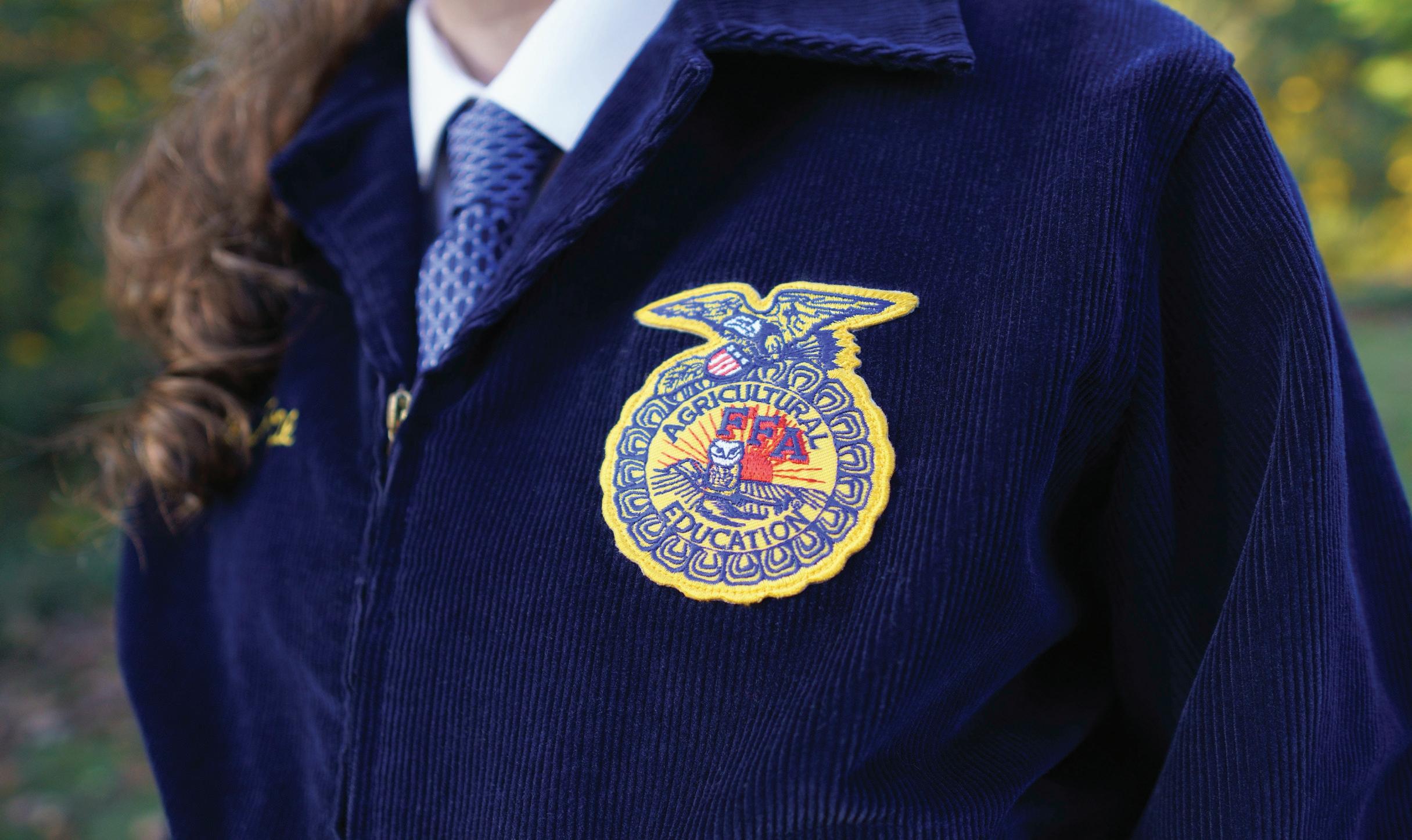 By Kaelyn Rahe
By Kaelyn Rahe
The FFA Creed states, “I believe in the future of agriculture, with a faith born not of words but of deeds – achievements won by the present and past generations of agriculturists; in the promise of better days through better ways even as the better things we now enjoy have come to us from the struggles of former years.”
The McLeod County Corn & Soybean Growers board took this phrase to heart and put their boots to the ground to help build relationships with next generation of leaders.
In doing so, the board (Brownton farmer and Minnesota Soybean Growers Association Treasurer Ryan Mackentun represents McLeod County on MSGA) connected with local FFA chapters in McLeod County to purchase MSGA student memberships to show local students the value of advocacy and supporting commodity organizations.
“I feel the future is where it is at. If we don’t have anybody to take over in our footsteps, everything that we do every day is for nothing,” said Mandy Dammann, a McLeod County Corn & Soybean Growers board member who brought forth the idea to
her colleagues. “Anything to get these kids involved is vital, and it is our job to promote it.”
Glencoe Silver Lake FFA and Hutchinson FFA were the chapters that received members. Each chapter was awarded nine MSGA student memberships.
“They were extremely thankful for the opportunities that membership has to offer and were excited to stay in the loop of what is going on,” Dammann said.
MSGA President Bob Worth, a vocal proponent of increasing and diversifying MSGA’s membership ranks, was excited to see McLeod County’s outreach efforts.
“If you get the youth to understand what MSGA is all about, they will most likely become full time members when they are done with school,” Worth said.
Worth looks forward to encouraging more young leaders to get involved in MSGA.
“I can’t stress enough that we need to get our young members up to speed so that they feel comfortable,” Worth said. “And I also would like to continue to see more young individuals become more involved in MSGA in the future.”
The Minnesota Soybean Growers Association extends our thanks to the 50+ members who joined MSGA in early 2023. January and February are two of our busiest months for renewals, and this winter was no different. We appreciate the nearly 500 members who renewed their support of MSGA!
Together, we’re moving agriculture forward and fighting on your behalf St. Paul and Washington, D.C. To join the nation’s premier state soybean association, visit mnsoybean.org/msga/invest. Membership levels start at
Member County
Greg Grausam Brown
Sam Hoffmann Brown
John Rusten Clearwater
Jeff Schultz Faribault
Steve Highum Fillmore
Matthew Becker Jackson
Kurt Koehler Martin
Matt Dammann McLeod
Ella Filk McLeod
Paul Wright McLeod
Allie Willcox McLeod
Ryan Jopp McLeod
Arthur Friauf McLeod
Paisley VonBerge McLeod
Owen Schauer McLeod
Rachel Visser McLeod
Karli Felland McLeod
Zachary Hausladen McLeod
Lydia Nelsen McLeod
Andy & Kim Rasmussen McLeod
Rebekka Paskewitz McLeod
Brianna Matheny McLeod
Brooke Albers McLeod
Braxton Rose McLeod
David Ludowese McLeod
just $20 for students, and a 3-year membership costs less than a quarter per day!
All MSGA members receive the following benefits and discounts:
• Clean Fuels Alliance America Vehicle Discount
• Cabela’s discount (10%)
• Commodity Classic Registration - $100 Savings
• American Soybean Association (ASA) Membership
• $5,000 College Scholarship Opportunity
• Ability to join 40 Square Health Plans
Emma Salisbury McLeod
Shelby Swanson McLeod
Eric Moore McLeod
Jaxin Anderson McLeod
Sam Becker McLeod
Mackenzie Martinson McLeod
Taylor Schwarze McLeod
Jackie Vos Murray
Wyatt Christians Murray
Jesse Polk Murray
Allen Oswald Nicollet
Nate Johnson Nicollet
Carl Sackreiter Olmsted
Brian Tulley Out of State
James Fultz Redwood
Daniel Gegner Redwood
Parker Revier Renville
Derek Storey Roseau
Matt Ulwelling Roseau
Mark Hagberg Sibley
Kale Van Bruggen Stearns
Thomas Margaard Stearns
Matt Pichner Steele
Michael J. Ditlevson Steele
Jordan Thieschafer Todd
Andrew Arduser Watonwan
Name:____________________________________Date of Birth:______/________/_______
Farm/Company Name:______________________________________
Address:___________________________________________________________________
City:_____________________________State:______Zip:_________County:_____________
Email:*________________________Phone:*_________________Cell:__________________
3 Year Membership: $250 (includes Minnesota Soybean sweatshirt and $100 biodiesel rebate)
Pullover size (circle one): S M L XL XXL XXXL
Biodiesel Coupon (Value $100)
1 Year Membership: $120
Yes I want to save $20! 1 Year Membership: $100 (with auto renew payment via credit card). By checking this option, I understand my annual membership to MSGA will renew automatically, charging the credit card on file at the time my membership expires Young Professional (age 35 and under) & Retired: $70
Student (age 22 and under): $20
I’m a new member Renewing member ID#____________Recruiter Name:______________
Payment information:
Check Enclosed (payable to MSGA)
CC: (VISA/MASTER/DISC/AMEX)
Card:__________________________
Exp. Date (M/Y):____/____
CVV:_______
Signature_______________________
Minnesota Soybean Growers Association 1020 Innovation Lane Mankato, MN 56001 507-388-1635
Online applications also available at mnsoybean.org/msga/invest

40 Square Cooperative Solutions
Ag Innovation Campus

Agweek
AgCountry Farm Credit Services

AgriGrowth
Arnold’s Equipment
BASF Agricultural Solutions
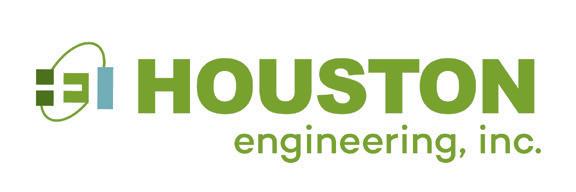
Bennett Government Consulting
Biovante
Blue Earth County Corn & Soybean Growers Association
MSGA Treasurer- Ryan Mackenthun
Brown County Corn & Soybean Growers
Clay/Wilkin County Corn & Soybean Growers Association
Compeer Financial
Crystal Valley
Dakota/Rice Corn & Soybean Growers Assocation
Dodge County Corn & Soybean Growers Associattion
Douglas County Corn & Soybean Growers Association
Duerr Government Affairs LLC

Faribault County Corn & Soybean Growers
Freeborn County Corn & Soybean Growers Association
Gislason & Hunter LLP
Gold Country Seed
Goodhue County Corn & Soybean Growers Association
ASA Director Jim Kukowski
Kandiyohi County Corn & Soybean Growers Association
Kittson County Soybean Growers Association
Koch Agronomic Services
Legacy Seeds
Lincoln County Corn & Soybean Growers Association
Lyon County Corn & Soybean Growers Association
Marshall County Soybean & Soybean Growers


Martin County Corn & Soybean Growers Association
McLeod County Corn & Soybean Growers
MN Biodiesel Council
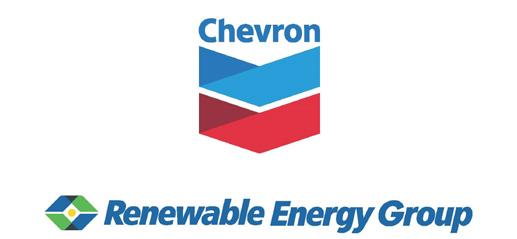
MN Farmers Union
MN Pork Board
Mower County Corn & Soybean Growers Association
Murray County Corn & Soybean Growers Association
Navigator CO2-Heartland Greenway
Nicollet-Sibley County Corn & Soybean Growers Association
Nobles County Corn & Soybean Growers
Norman County Corn & Soybean Growers Association
Novozymes BioAg
Olmsted-Wabasha Corn & Soybean Growers
Pennington-Red Lake Corn & Soybean Growers Association
Pivot Bio
Polk County Corn & Soybean Growers Association
Pope County Corn & Soybean Growers Association
Redwood County Corn & Soybean Growers Association
Renville County Corn & Soybean Growers Association
Rock County Corn & Soybean Growers Association
Roseau-LOW County Soybean Growers Association

Swift County Corn & Soybean Growers Association
Watonwan County Corn & Soybean Growers Association
Yellow Medicine County Soybean Growers Associaiton
Ziegler CAT